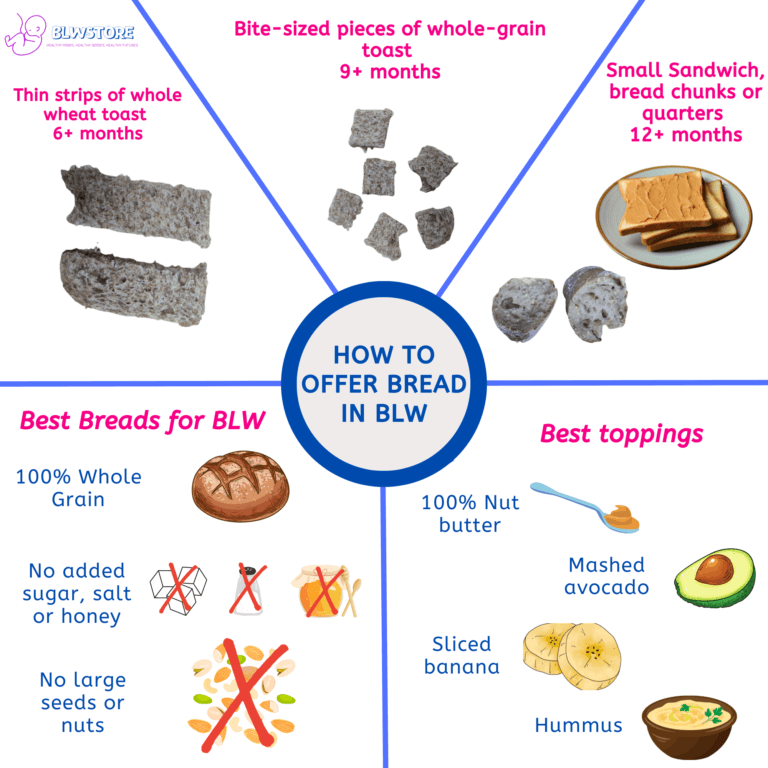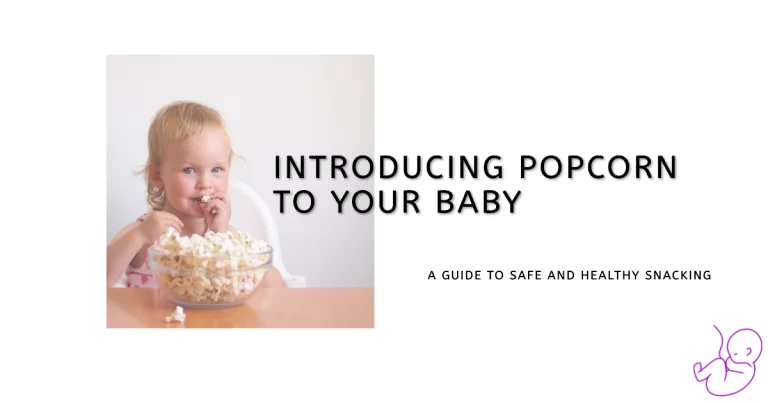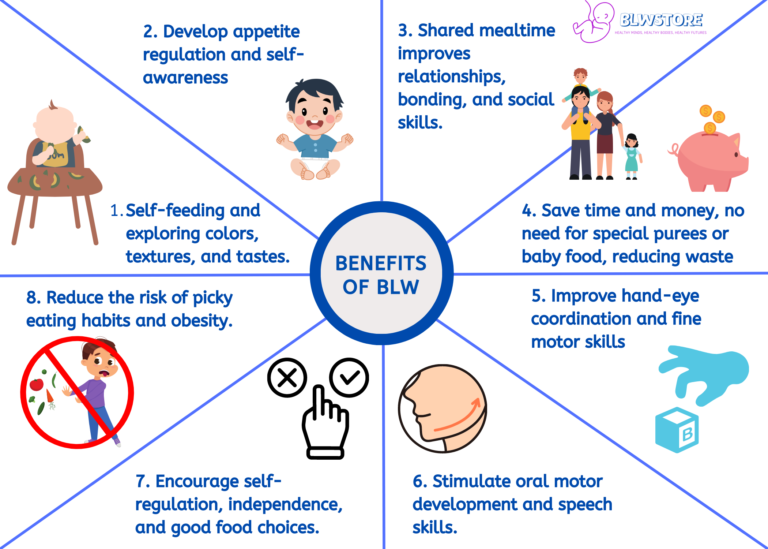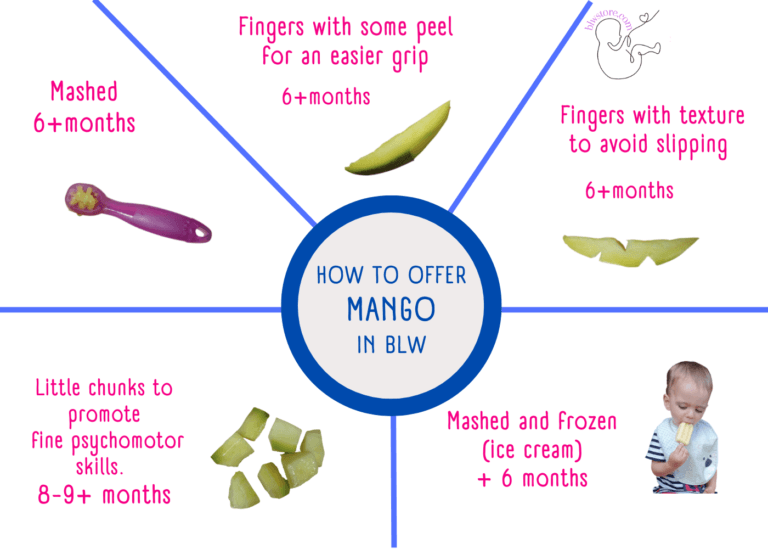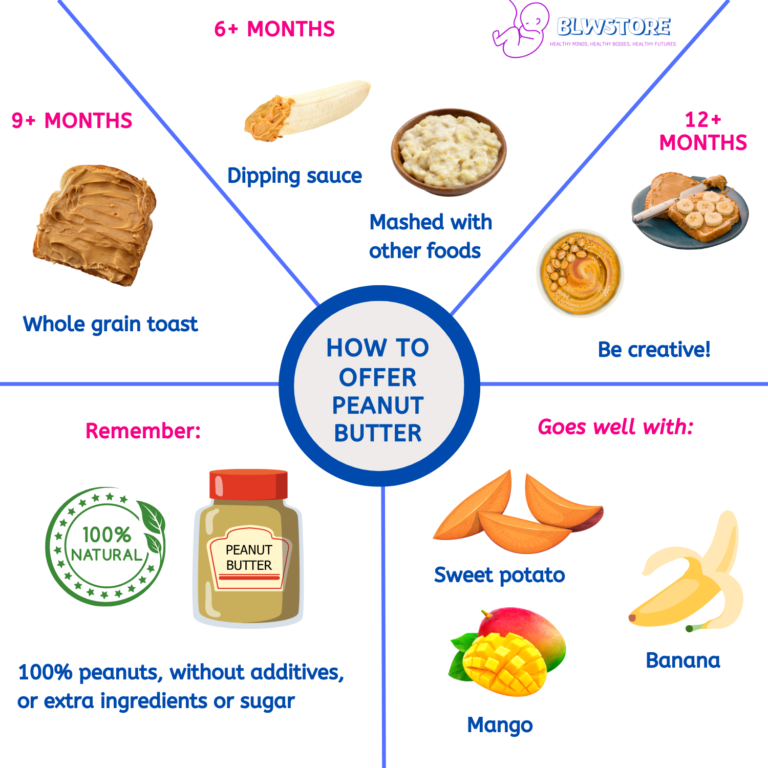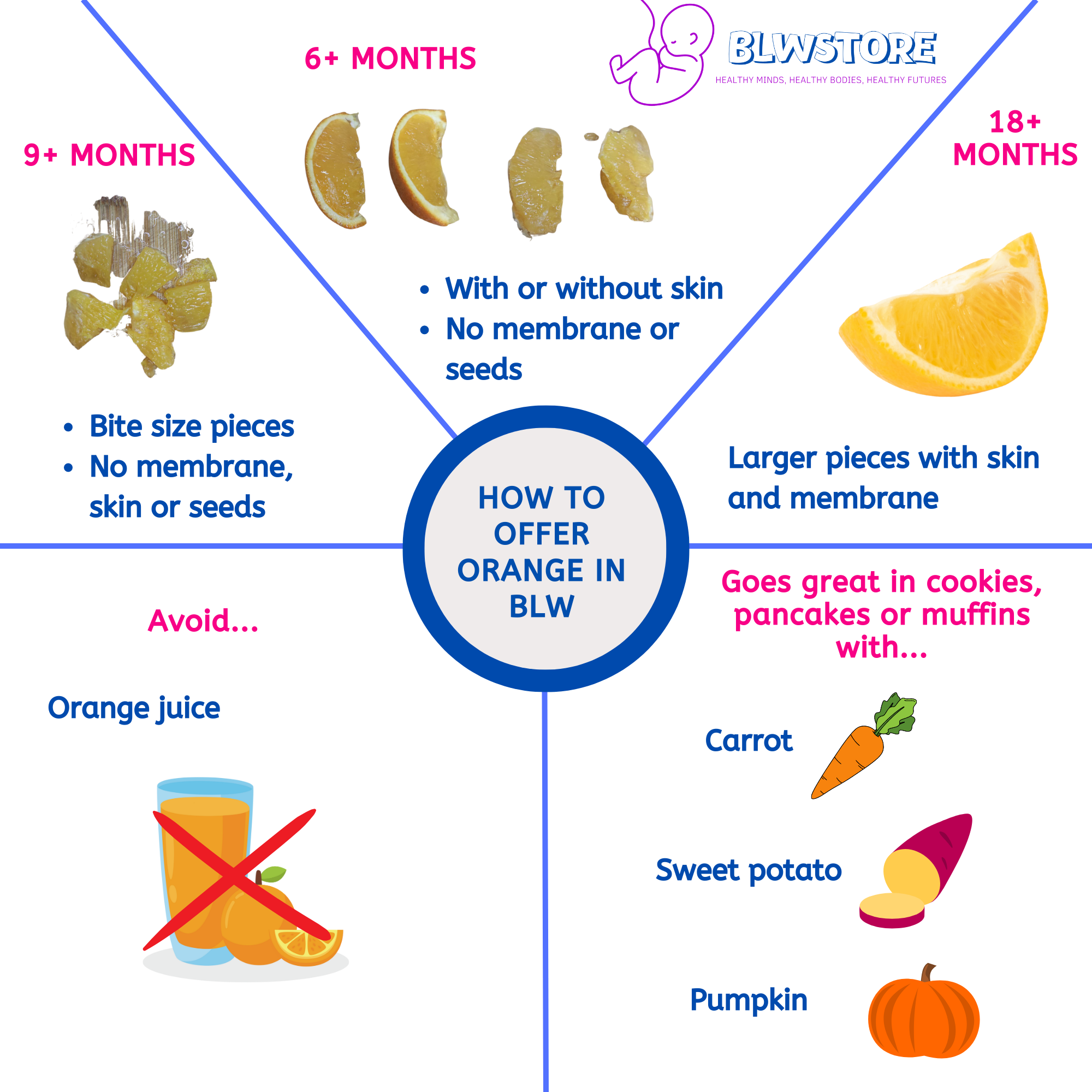
In this article, we’ll discuss the benefits of oranges for babies, when and how to introduce them, ways to serve them in line with baby-led weaning principles, and even a few delicious recipes to try out with your little one.
Let’s get after it!
Key Takeaways
- Introduce oranges to your baby when they are ready for solids, around 6 months of age.
- Oranges provide essential nutrients like vitamin C, fiber, potassium, and folate, promoting overall health and development.
- Valencia oranges are highly nutritious and delicious, but all orange varieties offer similar benefits.
- To serve oranges safely, remove seeds and membranes, and offer age-appropriate pieces (wedges for 6-9 months, bite-sized pieces for 9-18 months, and larger pieces with membrane intact for 18-24 months).
- Improperly prepared oranges can be a choking hazard; always supervise your baby during mealtimes.
- Oranges are not a common allergen, but they can still trigger allergic reactions or cause skin irritation due to their acidity.
- Some babies may find oranges gassy or hard to digest due to their fiber and sorbitol content.
- Try orange recipes like orange, sweet potato, carrot puree, orange pancakes, or orange muffins for your baby.
- Store oranges in a cool, dry environment; refrigerate peeled or cut oranges in an airtight container.
- Organic oranges may be worth it if you’re concerned about pesticide exposure, but thoroughly washed and peeled conventional oranges are still beneficial.
- Avoid giving orange juice to babies under 12 months; whole oranges are a more nutritious option.
When can you introduce oranges to your baby?
Babies can start eating oranges as soon as they are ready to start solids, usually at six months of age.
What are the benefits of oranges for babies?
Oranges are a great source of vitamin C, which helps support the immune system and promotes iron absorption from plant-based foods.
Oranges also contain fiber, potassium, and folate, improving overall health and development.
However, it is essential to note that oranges can be acidic and may cause or worsen reflux in some babies. Hence, it’s best to introduce them in moderation and consult a healthcare provider if your baby has digestive issues.
| Nutrient | Amount per 100g |
|---|---|
| Calories | 47 |
| Protein | 0.9g |
| Fat | 0.1g |
| Carbohydrates | 12g |
| Fiber | 2.4g |
| Vitamin C | 53.2mg |
| Vitamin A | 11μg |
| Folate | 30μg |
| Calcium | 40mg |
| Potassium | 181mg |
What is the most nutritive kind of orange?
Oranges come in a wide range of types, but they all share a similar set of nutritional advantages.
Valencia oranges are among the most delicious and are a significant fiber and vitamin C source.
All orange varieties, though, can be a wholesome supplement to a baby’s diet.
How to serve orange to baby
Babies can enjoy the sweet taste and nutrition of oranges as early as six months old, but it’s important to prepare oranges for your little one properly.
Citrus fruit, like oranges, should be introduced gradually to avoid potential allergic reactions.
As with any new food, it’s recommended to watch closely for any signs of an allergic reaction when babies eat oranges.
6 to 9 months
Wash the orange with the skin on, cut it into large wedges, and remove the seeds and membrane to avoid choking.
You can also offer wedges of the same size but without the skin. The baby will suck and chew on the fruit, but it’s important to stay within arm’s reach in case they put a piece that’s too big in their mouth.
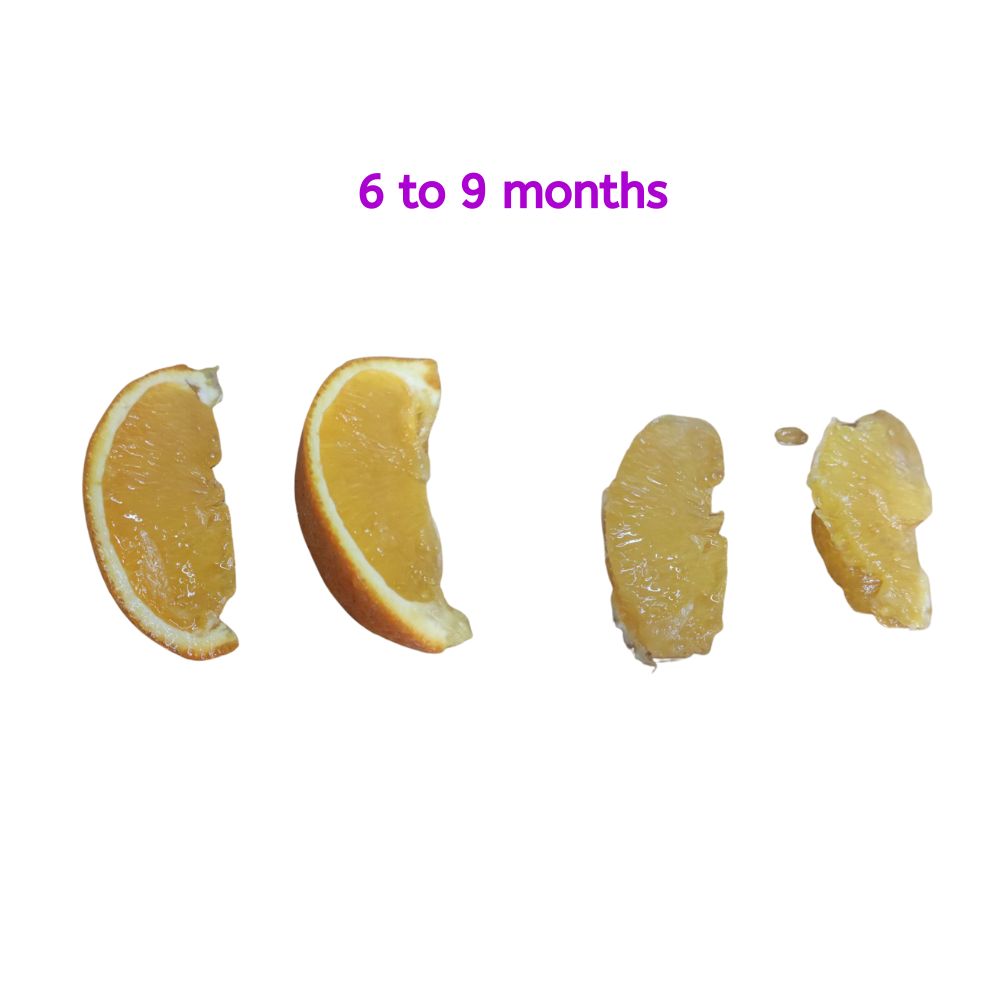
9 to 18 months
You can start offering your baby bite-sized pieces of orange without the skin so they can use their pincer grip to pick them up.
Remember to remove the seeds and membrane.
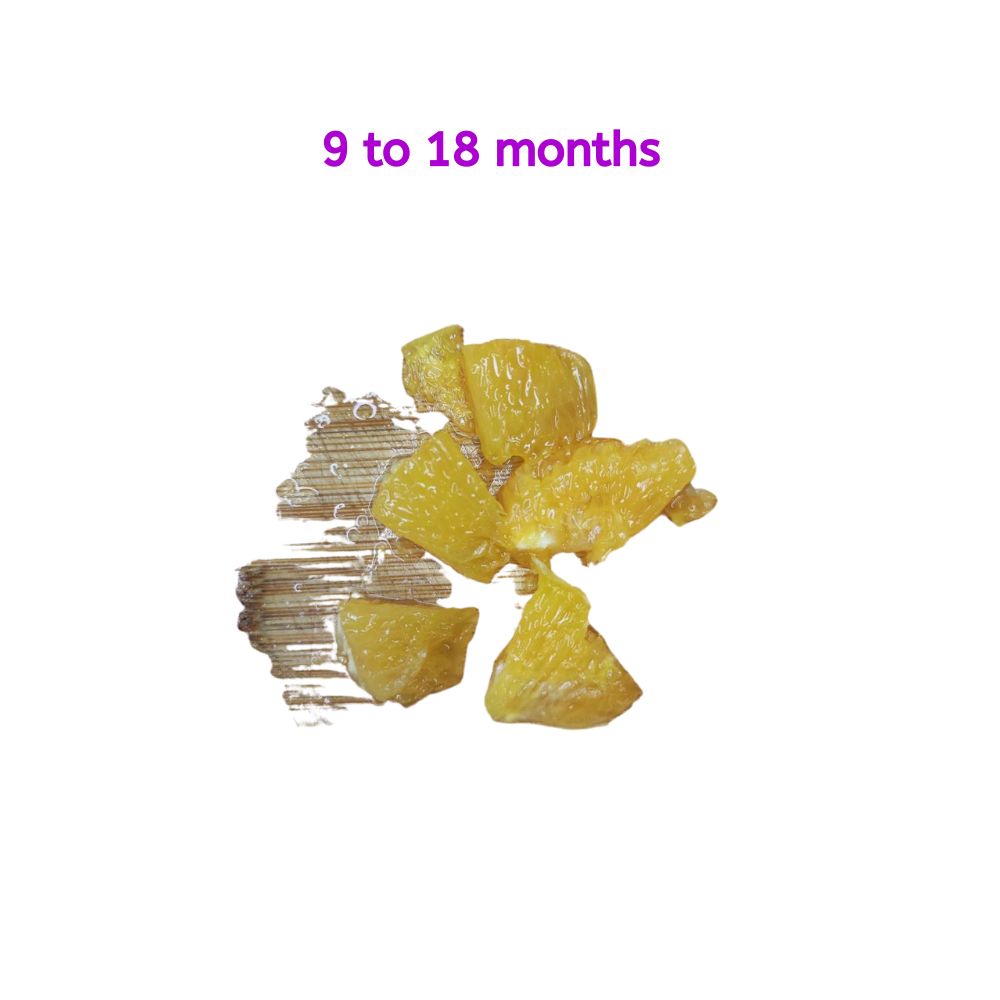
18 to 24 months
If your baby is comfortable chewing, you can offer the orange in large pieces with the membrane intact.
You can continue to give bite-sized pieces and large wedges with the skin on so that they can practice biting and tearing.
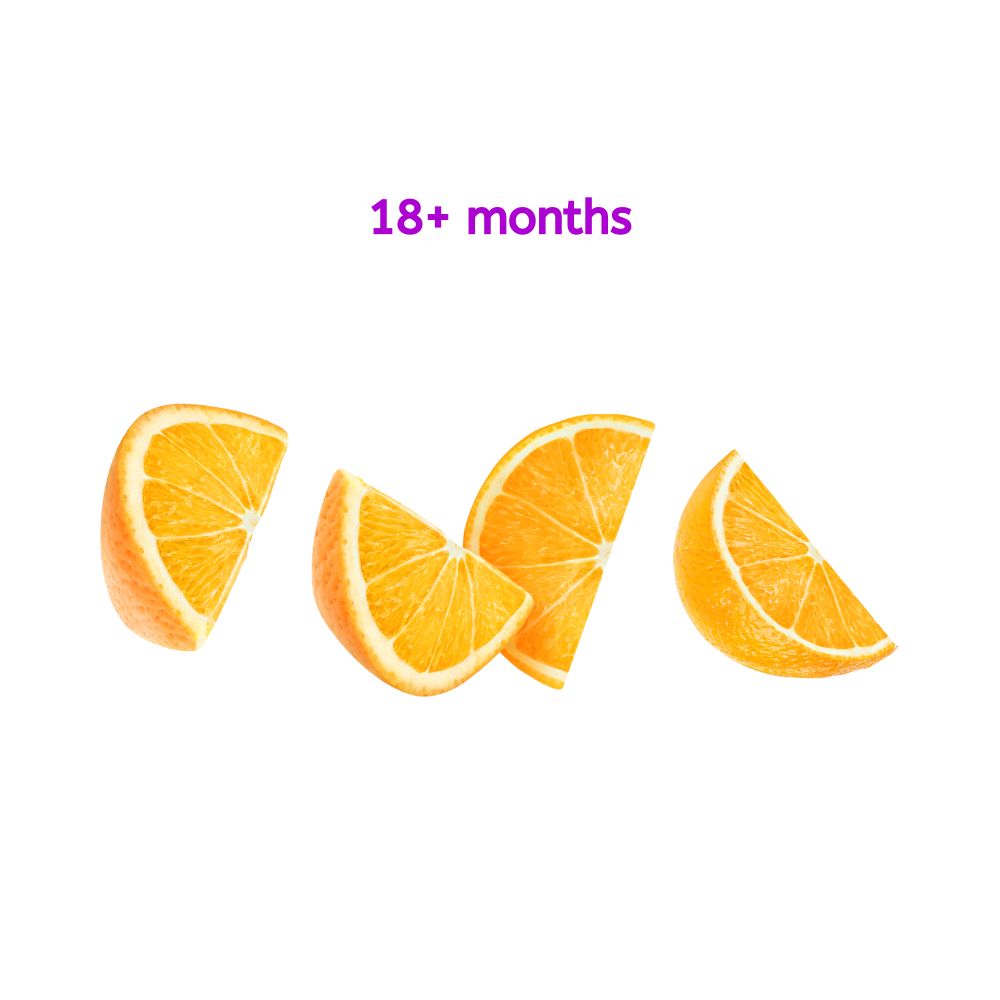
Are oranges a common choking hazard for babies?
Yes, improperly prepared oranges can be a choking hazard for babies and young children.
Removing the seeds and tough membranes before offering oranges to your baby is essential, as these can pose a choking risk.
To minimize the risk, you can serve the orange on the rind for the baby to gnaw and suck on, cut oranges into thin slices, or simply cut off the top of the membrane from each orange segment to make it easier to gum.
Once a baby has moved onto finger foods, you can cut each segment into small pieces with kitchen scissors.
Always supervise your child during mealtimes and ensure they sit upright while eating to minimize the risk of choking.
Oranges can still be a great fruit to offer once your baby is ready for finger foods, and they are likely to become a favorite due to their sweet taste and high nutritional value.
Are oranges a common allergen for babies?
Oranges are generally safe for babies, but they can still trigger allergic reactions as with any food.
Oranges are not considered a common allergen for babies, but they can still trigger allergic reactions.
Rarely, raw oranges may cause a contact allergic reaction called oral allergy syndrome (OAS), which is usually caused by cross-reaction in allergens found in both pollen and raw fruits and vegetables.
However, babies and toddlers are not typically affected by OAS.
Another potential reaction to oranges is a mild skin irritation caused by the high acidity of citrus fruits. This redness is usually harmless and temporary, but if it makes your baby uncomfortable, it’s worth bringing it up with the pediatrician to confirm that it’s not a food sensitivity.
It’s also worth noting that individuals with Oral Allergy Syndrome and those who are allergic to grass and certain tree pollens may be more sensitive to citrus fruits, including oranges. Additionally, there are reports of orange ingestion contributing to eczema.
As with any new food, start by offering a small quantity and gradually increase it over future meals if there are no adverse reactions.
Are oranges gassy or hard to digest for babies?
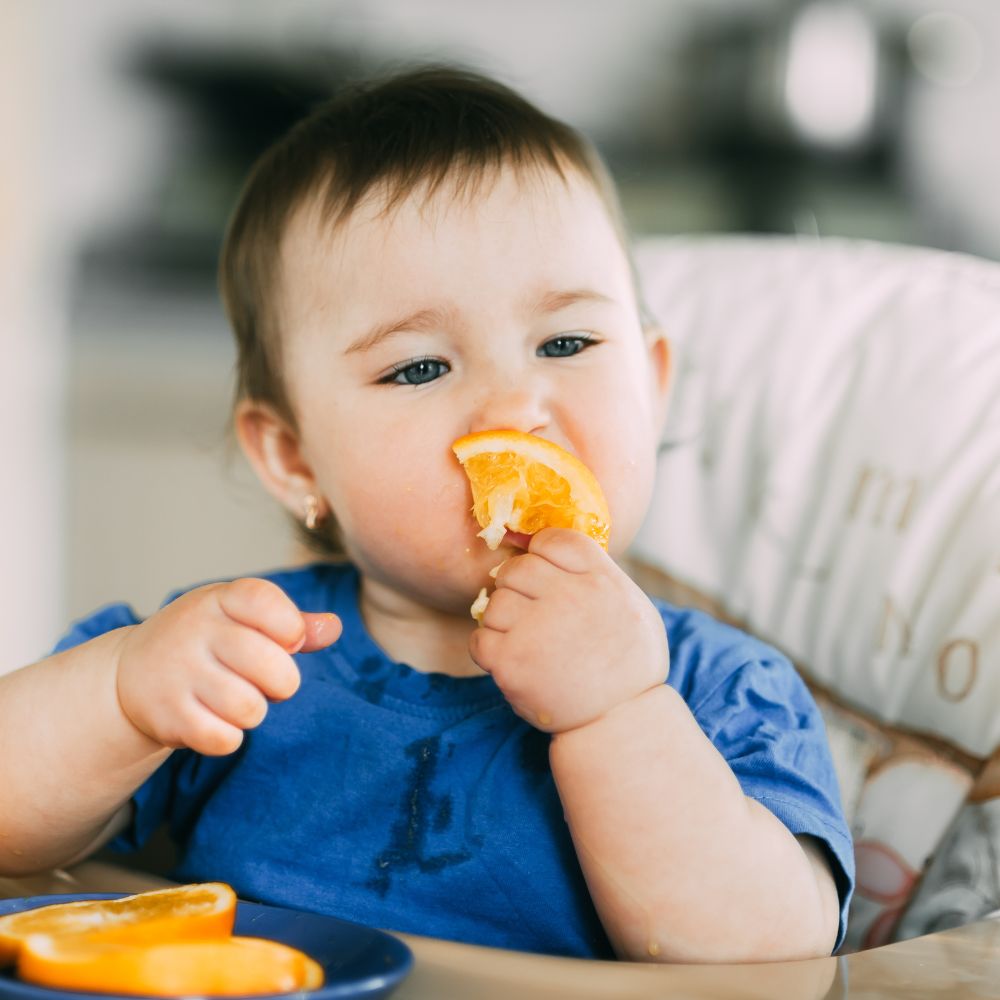
Oranges contain high levels of fiber and sorbitol, which can be difficult for some babies to digest, leading to gas and bloating. However, this varies from baby to baby, and some babies may tolerate oranges well.
It’s important to introduce oranges gradually and in small quantities to monitor your baby’s reaction. If you notice any digestive discomfort or changes in bowel movements, it may be a sign that your baby is having trouble digesting oranges. In this case, it’s best to consult your pediatrician for personalized advice.
Orange recipes for BLW
Orange, sweet potato, and carrot puree BLW recipe
Orange puree can be paired with many other fruits or vegetables, but ensure your baby has already tried each food individually. Then, you can prepare endless combinations of BLW orange puree so your baby can enjoy the variety of flavors and textures.
Ingredients:
- ¼ orange juice
- 100g sweet potato
- 100g carrot
Instructions:
- Peel the carrot and sweet potato and boil or steam them for 15 minutes.
- Remove them from the water and check that they are tender. If not, keep them in boiling water for another 5 minutes.
- Mash them and create a mixture.
- Add the orange juice.
Orange BLW Pancakes
Orange BLW pancakes are a quick, healthy, and delicious breakfast or snack option for your baby. They are easy and fast to make and will become one of your baby’s favorite meals.
Ingredients:
- Juice of 1 or 2 oranges
- Five tablespoons of oat flakes
- Four tablespoons of oat milk
- Three teaspoons of olive oil
- Ceylon cinnamon
Instructions:
- Add all the ingredients to the blender and blend well.
- Add a small drop of oil to a pan and spread it evenly with a kitchen towel.
- Once the pan is hot, spoon in some of the mixture and form a pancake using the back of a spoon.
- When one side is cooked, flip it over.
- Your orange BLW pancakes are ready for your baby to enjoy! You can serve them with a slice of orange with skin, so your baby can suck the juice out of the fruit while having some pancakes.
Orange BLW Muffins
This recipe is simple and delicious; your baby will love the texture and flavor. Here are the necessary ingredients and steps to prepare BLW orange muffins:
Ingredients:
- Juice of 1 orange
- Two eggs
- 200g whole wheat flour
- One packet of yeast
- One teaspoon of vanilla essence
Instructions:
- Mix all the ingredients in a bowl until you get a smooth mixture.
- Pour the mixture into the muffin molds and place them in the oven.
- Preheat the oven to 170Cº/338°F and bake the muffins for about 20 minutes or until golden brown.
How to store oranges
Oranges should be stored in a cool, dry environment. They can be stored at ambient temperature for several days or refrigerated for up to two weeks.
While storing whole oranges at room temperature, keep them out of direct sunshine and away from heat sources. Place them in a plastic bag or crisper drawer to preserve humidity when storing them in the refrigerator.
Oranges that have been peeled must be stored in an airtight container in the refrigerator. They are best consumed within two days following peeling.
If the oranges have already been cut, refrigerate them in an airtight container. They are best consumed within two days of being cut.
Are organic oranges worth it?
If you are concerned about pesticide exposure, buying organic oranges may be worth it since oranges are number 28 on the Dirty Dozen list, which ranks produce with the highest pesticide residues.
Organic oranges are grown without synthetic fertilizers, pesticides, and other harmful chemicals.
If you cannot afford organic oranges, it is still better to offer your baby conventionally grown oranges than no oranges at all.
Ensure you thoroughly wash and peel the oranges before offering them to your baby to help reduce pesticide residue.
Can babies drink Fresh Orange juice?
Avoid canned fruit and fruit juices. Always offer the natural version.
It is not recommended to give orange juice to babies. According to the American Academy of Pediatrics, babies under 12 months should not consume juice as it usually lacks the fiber of whole fruit.
Instead, babies should get their nutrients from breast milk or formula and then transition to solid foods.
After their first birthday, babies can have small amounts of 100 percent fruit juice as an occasional treat, but no more than 4 ounces a day.
However, even after the age of 1, whole oranges are a better choice as they are more nutritious than juice.
It’s essential to limit the amount of juice offered to children to minimize sugar in their diet and reduce the risk of health issues like diabetes, heart disease, and dental caries.
As always, it’s best to consult a healthcare provider before introducing new foods or beverages to your baby.
We’re Maria and Alberto, a married couple and educators who are nutrition enthusiasts. Even before we had kids, we were already crazy about nutrition.
We’d read scientific articles, watch videos from nutritionists, and spend hours listening to nutrition podcasts.
Today, we continue doing this, but in a different way, as we’ve learned to sift through the noise and trends. Nutrition, like any other field of knowledge, the more you read and learn, the more you develop a comprehensive understanding of reality, and that’s what has happened to us.
Before having our first child, we focused on learning everything we could about child nutrition, using the same techniques we had already employed, backed by our extensive knowledge in nutrition.
Our mission is to help other parents with their children’s nutrition, to help them become the best versions of themselves.
If we are what we eat and drink, which is absolutely true, let’s do it right!



